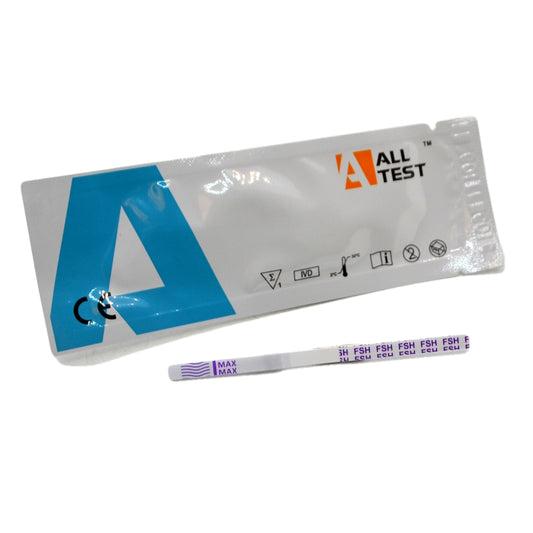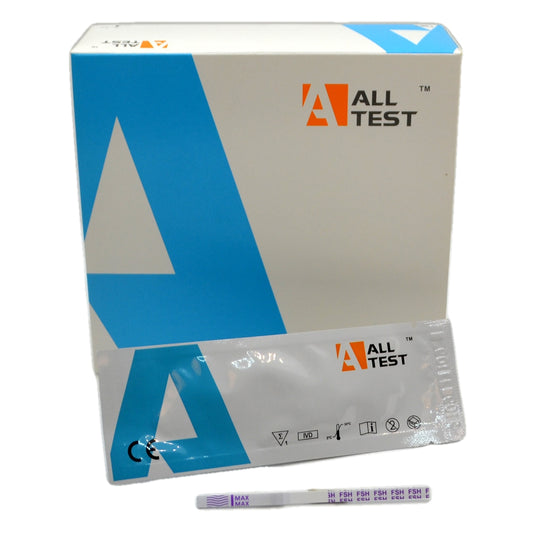Collection: Menopause Test
Test for the menopause and perimenopause
Testing for menopause and perimenopause at home is simple with these reliable home menopause test strips. They detect persistently elevated levels of FSH in urine, a key indicator of perimenopause and menopause.
-
ALLTEST Menopause And Perimenopause Test Kit
No reviewsRegular price From £2.95 GBPRegular priceUnit price / per
FSH test
The home menopause FSH test is a simple and reliable urine test designed to detect persistently raised levels of follicle-stimulating hormone (FSH), a key indicator of perimenopause and menopause. These convenient FSH test strips are available in packs of 3, 5, 10, or bulk packs of 50.
How does the home menopause test work?
Home urine FSH test kits offer a convenient means for women to monitor their FSH (Follicle-Stimulating Hormone) levels from the comfort of their own homes. FSH, is produced by the pituitary gland, and plays a key role in reproductive health, influencing menstrual cycles and fertility. By collecting urine samples at specific times during the menstrual cycle, you are able to track their FSH levels.
This information is particularly valuable for women aiming to conceive, as elevated FSH levels may indicate reduced ovarian reserve or menopause. While home urine FSH tests provide accessibility and ease of use, it's important to interpret abnormal results in consultation with a healthcare professional for appropriate guidance.
Menopause test & menopause test kits – Everything you need to know
Menopause is a natural stage of life, but it can often feel confusing and overwhelming. Many women start to experience symptoms such as hot flushes, mood swings, disrupted sleep, and irregular periods in their forties or fifties, but it isn’t always clear whether these changes are due to menopause, perimenopause, or something else.
A menopause test kit can help you gain clarity. Simple to use at home, these kits measure hormone levels to give an indication of whether you may be approaching or experiencing menopause.
What is a menopause test?
A menopause test measures the level of follicle-stimulating hormone (FSH) in your body. FSH plays a role in stimulating the ovaries to release eggs. As you approach menopause, your ovaries gradually produce fewer eggs and less oestrogen, which causes your FSH levels to rise.
Most home menopause tests use a urine sample to check for raised FSH levels. Elevated readings can be a sign that you are entering perimenopause or menopause.
Why use a menopause test kit?
While menopause is usually diagnosed based on symptoms and medical history, a test can provide extra reassurance. Some of the key benefits include:
- Convenience – test in the comfort of your own home.
- Speed – results are usually available within minutes.
- Privacy – no need for an immediate GP appointment.
- Clarity – helps you understand whether hormonal changes could be the cause of your symptoms.
However, it’s important to remember that hormone levels fluctuate, and a single test should not replace professional medical advice.
When should you take a menopause test?
You may consider taking a menopause test if you are:
- Over 40 and experiencing irregular or missed periods.
- Having classic symptoms such as hot flushes, night sweats, or mood changes.
- Unsure whether your symptoms are related to menopause, stress, or another health condition.
For the most accurate results, many kits recommend testing your urine first thing in the morning. Some women find it useful to test more than once, a few weeks apart, as hormone levels can vary throughout the month.
How to use a home menopause test kit
Although instructions can differ between brands, most menopause test kits follow a simple process:
- Collect a urine sample, ideally in the morning.
- Dip the test strip or hold the test midstream, depending on the kit.
- Wait the specified time (usually 5–10 minutes).
- Read the results – often displayed as lines, similar to a pregnancy test.
Always follow the directions included with your kit for the most reliable results.
Understanding the results of the FSH menopause test
- Positive result (high FSH): May suggest you are entering perimenopause or menopause.
- Negative result (normal FSH): You may not yet be in menopause, or you could still be in the early stages of perimenopause.
Because hormone levels fluctuate, a negative result does not necessarily mean you are not in menopause. If symptoms persist, retest after a few weeks or speak to your GP.
Home menopause tests vs. medical diagnosis
While home test kits for menopause are a helpful tool, they should not replace a professional medical consultation. Doctors often diagnose menopause based on symptoms, age, and medical history. Blood tests may also be used, especially if you are under 45 or have unusual symptoms.
If you have concerns about your health or your menopause symptoms are severe, always seek medical advice.
FAQs about menopause test kits
Q. How reliable are home menopause tests?
They can provide a good indication of hormonal changes, but results are not 100% conclusive. Hormone levels naturally fluctuate, so testing at different times may give varying results.
Q. Can I be in menopause even if my test is negative?
Yes. A single negative result does not rule out menopause. If symptoms continue, test again in a few weeks or consult your GP.
Q. Do HRT or contraceptives affect the results?
Yes. Hormone replacement therapy (HRT), contraceptive pills, and other hormonal medications can influence FSH levels and affect test accuracy.
Q. At what age should I start testing for menopause?
Most women experience menopause between ages 45 and 55, but symptoms can begin earlier. If you are over 40 and notice irregular periods or classic symptoms, testing may help provide clarity.
Q. What’s the difference between perimenopause and menopause?
Perimenopause is the transitional phase when hormones fluctuate and symptoms begin, often lasting several years. Menopause is reached when you have not had a period for 12 consecutive months.
Q. Do I still need contraception if I’m in menopause?
Until menopause is fully confirmed, there is still a chance of pregnancy. Speak to your GP or sexual health professional for guidance on when it’s safe to stop using contraception.
Important
A menopause test kit can be a helpful first step in understanding your symptoms and hormone changes. Easy to use at home, these tests give quick results and may provide reassurance during a time of transition.
However, menopause is best confirmed by a combination of your age, symptoms, and medical history. If you are unsure or struggling with symptoms, always consult your GP for advice and support.
Collapsible content
What is a home menopause FSH urine test strip?
A home menopause FSH urine test strip is a simple at-home test that measures the level of follicle-stimulating hormone (FSH) in your urine. Raised FSH levels can indicate perimenopause or menopause.
How do these FSH urine test strips work?
The strips detect elevated FSH in your urine. During menopause, the ovaries produce less oestrogen, which causes the body to increase FSH. By testing your urine, these strips provide a quick indication of hormonal changes.
How accurate are FSH home test strips?
These test strips are generally very reliable for detecting raised FSH levels in urine, but hormone levels fluctuate throughout the month. For the most accurate results, it is recommended to test first thing in the morning as the urine is more concentrated and, if needed, repeat the test a few days later to confirm that it is still elevated. A persistently elevated FSH level is significant, and suggests perimenopause, menopause or other health conditions associated with persistently elevated FSH.
How do I use a home menopause FSH test strip?
- Collect a urine sample in a clean container.
- Dip the FSH test strip into the urine for the recommended time.
- Lay the strip flat and wait the instructed number of minutes.
- Read the result by comparing the test strip to the guide provided in the kit.
When should I take the menopause test?
Testing is most useful if you are experiencing symptoms such as irregular periods, hot flushes, night sweats, or mood changes, typically in your 40s or 50s. Morning urine is recommended for the most consistent results.
What does a positive result on an FSH menopause test mean?
A positive result (indicating raised FSH) may suggest you are entering perimenopause or menopause. Results should be interpreted alongside symptoms and, if needed, confirmed by your GP.
Can the menopause test give false results?
Yes. FSH levels fluctuate, and certain factors such as medications, HRT, or hormonal contraceptives can affect results. A negative test does not always rule out menopause, especially during the early stages.
How often should I perform the home menopause test?
If your first test is unclear or negative but you still have symptoms, retest after a few weeks. Hormone levels can vary, so multiple tests may provide a more accurate picture.
Are these FSH test strips safe and easy to use?
Yes. They are non-invasive, safe, and easy to use either in the clinic or at home. Simply follow the instructions provided with your kit.
Do I still need to see a doctor about my menopause symptoms?
Yes. While these test strips provide helpful guidance, they do not replace a professional medical diagnosis. Consult your GP if you have persistent symptoms, health concerns, wish to look at treatment options including HRTor need further confirmation.


